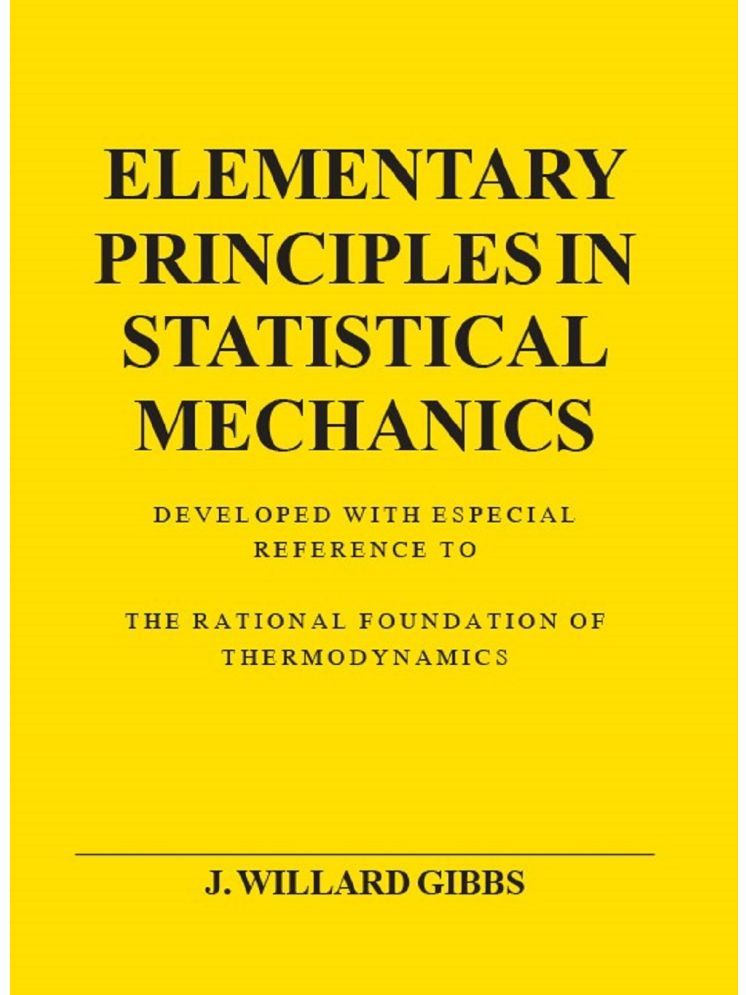Elementary Principles in Statistical Mechanics by Willard Gibbs is a foundational text in the field of statistical mechanics, a branch of physics that connects the microscopic properties of individual atoms and molecules to the macroscopic properties of materials, such as temperature, pressure, and volume. Originally published in 1902, this work is considered one of the most influential in the development of statistical mechanics and thermodynamics, providing a deep mathematical and theoretical framework that underpins much of modern physics.
Key Themes and Concepts in Elementary Principles in Statistical Mechanics:
Statistical Approach to Thermodynamics: Gibbs introduces the idea that thermodynamic properties can be understood in terms of the statistical behavior of large ensembles of particles. This approach provides a bridge between the microscopic world of atoms and molecules and the macroscopic world of thermodynamic quantities like energy, entropy, and temperature.
Ensembles and Distribution Functions: One of the key innovations of Gibbs’ work is the concept of an ensemble, which is a large collection of systems considered to be in all possible states. He develops the idea of a probability distribution that describes the likelihood of a system being in a particular state. These concepts are foundational for understanding how systems reach equilibrium and how their properties can be predicted statistically.
The Boltzmann Distribution: Gibbs builds on the work of Ludwig Boltzmann and others, extending their ideas to formulate the mathematical tools necessary for understanding the distribution of energy and particles in a system. He provides a detailed explanation of the Boltzmann distribution and its role in statistical mechanics, which describes the probability distribution of particles over various energy states.
Statistical Interpretation of Entropy: In his work, Gibbs provides a rigorous statistical interpretation of entropy. Entropy, which in classical thermodynamics is a measure of disorder, is redefined in statistical mechanics as a function of the number of possible microscopic states corresponding to a given macroscopic state. This concept is central to understanding the behavior of gases, liquids, and solids at the microscopic level.
The Concept of Partition Function: Gibbs introduces the partition function, which plays a central role in determining the macroscopic thermodynamic properties of a system. By using the partition function, it is possible to calculate quantities such as the internal energy, free energy, and entropy of a system, providing a connection between microscopic behavior and macroscopic observables.
Connection with Classical Thermodynamics: One of the goals of Gibbs' work is to show how statistical mechanics provides a microscopic explanation of the laws of thermodynamics. He demonstrates how statistical methods can derive and explain fundamental thermodynamic relations, including the laws of energy conservation and entropy increase.
Application to Gases and Liquids: Throughout the text, Gibbs applies his principles to ideal gases, explaining their behavior using the statistical framework. He discusses how the concepts of pressure, volume, and temperature emerge from the statistical properties of gas molecules in a container.
Mathematical Rigor and Physical Insights: Gibbs’ work is marked by a balance between mathematical rigor and physical insight. His derivations and explanations provide a deep understanding of the statistical foundations of thermodynamics, offering clarity on the fundamental principles governing physical systems.
Central Concept:
The central idea of Elementary Principles in Statistical Mechanics is that macroscopic thermodynamic behavior can be explained through the statistical properties of microscopic particles. Gibbs shows how statistical mechanics provides a unified framework for understanding the thermodynamic properties of materials, offering a more comprehensive and detailed approach than classical thermodynamics alone.
Elementary Principles in Statistical Mechanics is a highly technical but essential work for students and professionals in the fields of physics, chemistry, and engineering. It remains a key reference in the study of thermodynamics and statistical mechanics, influencing the way we understand the behavior of matter at both the microscopic and macroscopic levels.


